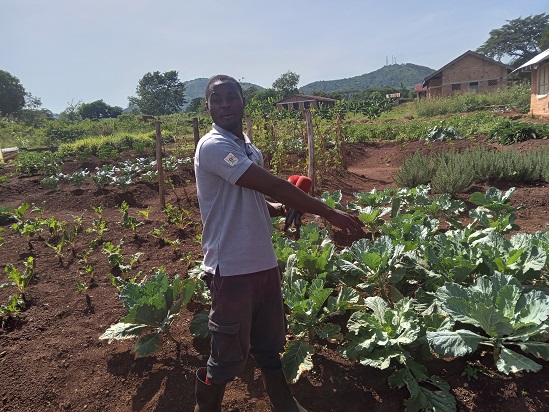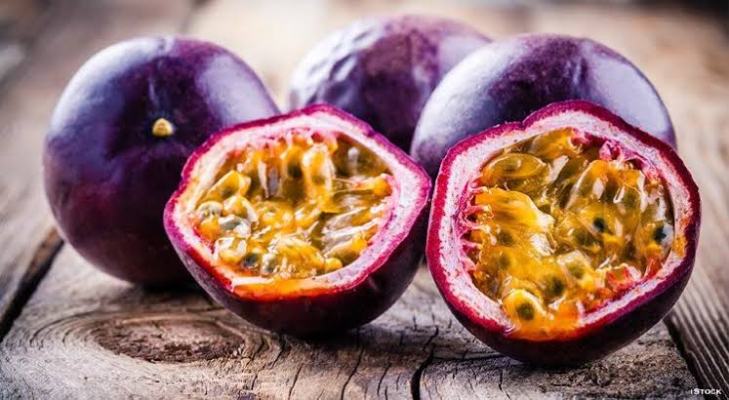Martin Marvin Musiime says one can earn Shs1m gross profit monthly from half an acre of land
You don’t need huge chunks of land to do commercial farming. The biggest asset you need is knowledge on how to utilize the little land you’ve got.
This conclusion is drawn from the one-acre model farm under the Stanbic Bank Hoima Business Incubator Centre located in Bujumbura West, Hoima City.
The Centre is utilizing the land and facilities belonging to Hoima Catholic Diocese that had been left to go to waste for many years .
According to Tony Otoa, the Chief Executive at Stanbic Bank Business Incubator Ltd, the land and facilities they are using used to be a model farm for Hoima Catholic Diocese in the1980s and 90s before it was abandoned for unknown reasons.
“Stanbic talked to the diocese to use part of the land for the one-acre model. It has been vacant for quite some time until Stanbic took over some areas of the farm. There are poultry and piggery structures. Currently, there are a few pigs. We want to support the diocese and local people to activate their farming,” Otoa told Business Focus during a recent visit to the Centre.
“Ideally, it was set to be a robust model farm that was set up by the Belgians for Hoima Catholic Diocese,” Otoa says, adding that they have trained hundreds of farmers who are now supplying fresh food items to players in the oil and gas sector.
He says they partner with Pure Grow Africa, a company that is also already buying vegetables from farmers and supplying them to key buyers in the oil and gas sector as well as key supermarkets like Carrefour.
Inside the one-acre model farm
Martin Marvin Musiime, the Project Manager of the one-acre model at the Stanbic Bank Hoima Business Incubator Centre, says there are a number of crops on the one-acre demonstration farm including vegetables, corn/maize, some fruits, some chicken and a few pigs.
The vegetables include cabbages, collard greens (Sukuma Wiki), tomatoes, lettuce, long apple egg plants and egg plants among others.
The land is subdivided into small plots and the smaller gardens are raised for easy management. For example, a smaller garden can accommodate 140 plants of cabbages.
“If you manage them very well, you will get good results,” Musiime says, adding that a farmer can get food from different gardens to feed his or her family as well as earn a good income.
“We have improved on the nutrition of the farmers but they are also getting finances from the various items they sell,” he says.
He explains that they encourage farmers to focus on quality not quantity.
“For a longtime, farmers have been focusing on quantity without minding about quality. We are teaching them to do organic farming; we teach them how to make organic fertilizers and pesticides using locally available materials such as ash, water, molasses, broken charcoal, dung and some urine,” Musiime says.
This, he says, reduces on expenditure one would have incurred on artificial fertilizers and pesticides.
He says they mainly train farmers from Hoima and Kikuube districts.
Waste Management System
The Centre also deals with waste management from poultry by turning it into manure.
They also use waste from chickens to make maggots which are fed on chickens which he says reduces the cost of feeds by 50%.
“A chicken that is fed on maggots for one month weighs 1.8kgs. That’s for a broiler. This is good business for farmers. So, they have saved 50% of costs on feeds,” Musiime says.

They generate the maggots by collecting chicken waste and decomposing it in a drum so as to reduce heat and ammonia.
Thereafter, they bring in the black soldier fly (which is bought). The fly is caged inside a small structure where decomposed waste is.
“It’s caged so that it doesn’t escape. The the black soldier fly starts laying eggs that are introduced into the decomposed waste to form into maggots. The maggots mature in two weeks. They are washed to avoid contamination and the chicken eat them alive. Some of the maggots are made to grow into the black soldier fly,” Musiime says.

The chickens at the Incubator Centre are kept in cages. The five-week birds were weighing an average of 2.5kgs. They are fed on maize brand (Chachu) and maggots.
“The residue picked from maggots is stored and turns into manure,” Musiime says.
Good Earnings
Asked if one can earn good money from one acre, Musiime said it is very possible for a farmer to earn as high as Shs2m monthly from a well managed acre of land.
“For example, in April, we sold items worth Shs1.9m from small vegetables around. Recently, we had some tomatoes that are fading out now. So, the Shs1.9m mainly came from tomatoes, cabbages, long apple egg plants and some lettuce from the seven plots,” Musiime says.

He adds: “If a farmer does at least 70% of what we have taught them, a farmer is supposed to earn a gross of Shs1m from half an acre. A plot can have 140 plants of cabbages. Each lettuce is bought by Pure Grow at around Shs2,000.”
He adds that they have a small irrigation system that cost them Shs400,000. It can be moved around the one acre, implying that they farm through out the year.
They keep rotating crops on the various plots on the one acre.
The farm also has some good matooke despite the soil being poor.
Asked how they manage to keep the soil fertile from time to time, Musiime said they apply organic manure.
“Most of the farmers think it is labour intensive, but we teach them to group up or do it to their full capacity. Labour is not a problem as long as you’re making money,” he says.

SMEs Empowered
Stanbic Bank started the Business Incubator program in 2018 in Kampala to answer the question of why SMEs fail in their second year of business/operation.
“Stanbic looked at oil and gas sector. We wanted to empower SMEs. When we got our first cohort in Kampala in 2018, it became evident that the trainings had to be rolled out across the country,” Otoa says, adding: “Focus was on enterprise development including how local businesses can take up full contracts not just being sub-contractors.”
He says the Centre in Hoima was set up to target agriculture sector. He notes that the demand for food in Hoima is going up as oil and gas activities intensify.

He reveals that a lot of food supplied to companies in oil and gas sector has been coming outside Hoima, but the trend is beginning to change.
“The farmers are being trained on the right standards, we support them on how to market the products,” he says.
For inquiries, tips, opinions and advertising, Tel: 0775170346/0703828741/staddewo@gmail.com. Follow us on Twitter: @TaddewoS @BusinessFocusug







How can i get in contant with you?
My contact is 0715050112
Call: 0775170346/0703828741
Very useful information, I practice urban farming in about an acre in Kotido Karamoja, this information will help.me improve on my performance, contact me on 0772342637 to guide me more, thanks
Hi, is this program available in Kenya?